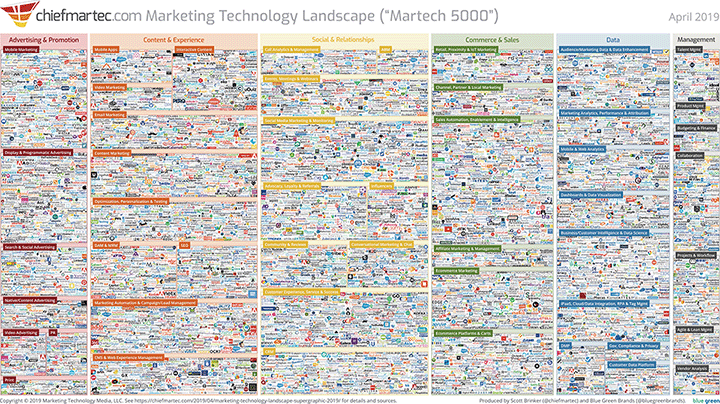How to Extend Your MarTech Solution's Use Cases
As everybody knows the marketing technology landscape is becoming increasingly complex and market participants are growing by the day (for anyone who is unfamiliar with how the vendor count has risen from 750 to over 7000 in 8 years, check out Scott Brinker's work).
It's easy to get swept along with the latest technology trend or bogged down in the debate as to what technology category the solution you are looking to implement belongs to. While these factors remain a source of confusion and frustration, thankfully it seems enterprises are increasing their focus on use cases when evaluating how to enhance their marketing technology stack.
Large enterprises that operate within B2C markets are all investing in MarTech primarily to transform to a more data driven sales and marketing model. In order to do this, they invest large sums of money in the attempt to assemble what is commonly called 'a 360-degree view of their customers'. This concept of an all-encompassing customer view is nothing new. Organizations have been trying to do this ever since marketers were introduced to basic databases, but as customers become more discerning and sophisticated, and as new consumer technology has been developed, the goal posts are continually shifting. By definition, a 360 view of the customer should contain and integrate all relevant information about each of the organization's individual customers and prospects, which includes all their behaviors and actions across all digital channels. As organizations become increasingly data rich and strive to enable the seamless flow of customer data to an expanding range of data end points, they need the ability to integrate data in a range of formats, from a range of sources for immediate activation.
Creating your use case roadmap
So, creating a definitive customer view is both a high priority and an enormous challenge for large enterprises and as a result there is a tendency to become consumed with the process. Many organizations do not adequately consider what they intend to actually do with the enhanced customer visibility they are striving for in both medium and long term timeframes. It is not possible to accurately design a system with all your organization's required capabilities until these use cases have been defined, predicted and documented. In effect, the process of creating a use case roadmap helps to avoid limiting factors within your customer data infrastructure which will limit the value you can gain from it further down the line.
What we are talking about here is not only future proofing your MarTech stack as far as is possible, but also ensuring that the data that it contains is not restricted to the confines of marketing or to 'conventional' use cases such as attribution or personalization. This may seem counter intuitive – naturally we expect marketing focused use cases from a MarTech stack, the clue's in the name! But as the field of marketing technology develops and becomes increasingly relevant, other departments within organizations will begin to recognize the power of the customer data that your MarTech stack houses.
Democratize your customer data
For some years, we have seen the most mature and forward thinking Celebrus clients democratize the data we capture, to ensure it is available throughout the organization. In years to come, as this trend becomes mainstream, organizations that did not plan for this will discover unforeseen challenges relating to data quality, format, compatibility and latency when attempting to adapt marketing owned customer data for fraud, risk, compliance, product development and other use cases.
Planning long-term data strategies
Over the coming months, we will be releasing a series of materials to help guide organizations on the path to long-term data maturity while considering their use case roadmap in detail, and we will be releasing an independently authored white paper on this subject. Celebrus will also be hosting a webinar on the subject of this blog which will provide practical advice on how to plan your use case roadmap.


